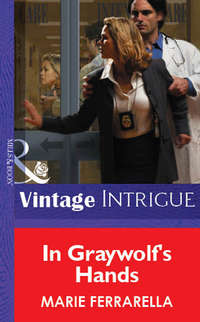
Полная версия
Dr. Forget-Me-Not

Praise for USA TODAY bestselling author Marie Ferrarella
“Ferrarella delivers a fabulous couple. Wonderful storytelling expertly delivers both lighthearted and tragic story details.”
—RT Book Reviews on Her Red-Carpet Romance
“An easy-read modern romance with a creditable and self-possessed heroine to steal your heart.”
—Fresh Fiction on Mendoza’s Secret Fortune
“She has a genuine knack for keeping the reader interested and involved in the characters and their emotional feelings.”
—Fresh Fiction on His Forever Valentine
“Expert storytelling moves the book along at a steady pace. A solidly crafted plot makes it quite entertaining.”
—RT Book Reviews on Cavanaugh Fortune
“Master storyteller Ferrarella has a magical way of spinning feel-good romances that readers can lose themselves in, and her latest is no exception.”
—RT Book Reviews on The Cowboy and the Lady
Dr. Forget-Me-Not
Marie Ferrarella

USA TODAY bestselling and RITA® Award–winning author MARIE FERRARELLA has written more than two hundred and fifty books for Mills & Boon, some under the name Marie Nicole. Her romances are beloved by fans worldwide. Visit her website, www.marieferrarella.com.
To
Nancy Parodi Neubert,
And
Friendships
That go back to the
3rd Grade
Contents
Cover
Praise
Title Page
About the Author
Dedication
Prologue
Chapter One
Chapter Two
Chapter Three
Chapter Four
Chapter Five
Chapter Six
Chapter Seven
Chapter Eight
Chapter Nine
Chapter Ten
Chapter Eleven
Chapter Twelve
Chapter Thirteen
Chapter Fourteen
Chapter Fifteen
Chapter Sixteen
Epilogue
Extract
Copyright
Prologue
“You haven’t finally decided to sell that beautiful house of yours and downsize to something a little smaller and more modern, now have you?”
It wasn’t really a question. Maizie Connors, sitting opposite the attractive woman in Jack’s Hideaway, Bedford’s newest trendy restaurant, knew better than to think that Charlotte, a woman she had known for close to forty years, would ever sell the house she loved so much. When she’d taken the unexpected call from her old friend that morning, Maizie had suspected something was up, but she’d instinctively known it had nothing to do with Charlotte making use of Maizie’s successful real estate business.
“What?” Charlotte asked. Sitting ramrod straight, doing her best to appear cheerful, Charlotte Stewart was caught off guard by the question. She also felt somewhat embarrassed, not just because of the deception she’d allowed to continue, but because of the real reason for her getting in contact with Maizie in the first place. She cleared her throat and stalled for time. Trying to get her thoughts together in order to find the right words. So far, they had frustratingly managed to elude her. “Oh, no, I haven’t,” she confessed, then added in a sincere moment of truth, “I don’t think I’ll ever sell that house. It’s where all the good memories are.”
Maizie smiled, nodding her head knowingly. Unlike Charlotte, who had gone stylishly gray, Maizie’s short bob was a light golden blond, the same color it had been when she’d first met her late husband all those years ago.
“I didn’t think so. So, Charlotte,” she asked, getting comfortable, “what’s this lunch really about?”
To be honest, Maizie was fairly certain she knew the answer to her question. As a successful Realtor, she had started her agency after her husband passed away years ago. It did a brisk business; but these days, she was just as accustomed to getting calls from people who sought her services for the business that she ran on the side as she was from people who wanted to either buy or sell houses.
Maizie, along with her two lifelong best friends, had an aptitude for making matches.
Lasting matches.
When Charlotte called, asking to see her over lunch, the woman had murmured something about needing advice and alluded to it being about selling her house. Surprised—since Maizie knew how attached her friend was to the only place she had ever called home once Charlotte’s late husband had slipped a ring on her finger, Maizie had played along until after appetizers had been ordered.
When Charlotte now made no reply to her question, Maizie leaned forward over the small table and placed her hand over her friend’s.
“We’ve been friends for almost forty years, Charlotte, you can tell me. No matter what it is, at my age, I’ve heard it before.”
Charlotte continued to look uncomfortable. “I don’t know where to start.”
Maizie’s smile was warm, encouraging. “Just jump right in and I’ll try to keep up.”
“It’s Mitchell,” Charlotte finally blurted out, referring to her only child.
Again, Maizie was fairly certain she knew what was coming, but she approached the subject slowly, not wanting to make her friend nervous enough to abruptly change her mind and table the subject.
Guessing at the true reason for this impromptu meeting, Maizie was well aware that the subject the other woman was attempting to broach was not an easy one for some mothers. Although genuinely concerned, mothers like Charlotte didn’t want to be seen as meddling, which was only a cut above words like controlling, calculating and interfering. No true mother wanted that label.
“Ah, how is Dr. Mitch these days?” Maizie asked, her blue eyes sparkling with humor.
The word escaped Charlotte’s lips before she could think to prevent it. “Lonely.”
“Is he?” Maizie asked with keen interest. She loved matching up people with their dream homes. She loved matching people up with their dream soul mates even more. The former came with a commission, the latter was priceless to her, even if the service itself was free.
“Except he doesn’t know it yet,” Charlotte hurriedly qualified.
Maizie was nothing if not patience personified. “Explain,” she requested.
“He’d really be annoyed if he knew I was saying this,” Charlotte interjected hesitantly.
“Then we won’t tell him,” Maizie assured her pleasantly. None of the protagonists in the matches she and her friends had undertaken ever knew that their “meetings” had been orchestrated. Things worked out far more naturally that way. “But you’re going to have to give me a little more to work with here.”
Charlotte took a deep breath and forged ahead, knowing that if she lost her nerve, if she told Maizie “never mind” and just left, the problem would only continue. And most likely get worse. She loved her son far too much to let that happen. He deserved to have a full life.
“Mitchell is a fantastic surgeon,” she said by way of an introduction to the crux of the matter.
Maizie nodded. “Like his father.” She was rewarded with a grateful smile from her friend.
“But he lacks Matthew’s gift for getting along with people.” Charlotte hesitated for a moment, knowing that wasn’t specific enough. She tried again. “He just doesn’t connect.”
“With his patients?” Maizie asked, quietly urging her friend on. She vaguely remembered Charlotte’s son as a quiet, intense young man.
“With anybody.” Charlotte sighed as she leaned forward over the table toward Maizie. “He’s brilliant, handsome and you couldn’t ask for a better surgeon—or a better son,” she tacked on.
“But...?” Maizie asked, fully aware that the word was waiting in the wings.
“But I’m never going to have any grandchildren.” Charlotte appeared distressed at the words she had just blurted out. “I know it sounds trivial—”
Maizie quickly cut her off. “Trust me, I understand perfectly. I was in your shoes once. So were some of my friends. Sometimes, you can’t just sit back and wait for the planets to align themselves. Sometimes, you have to drag those planets into place yourself,” Maizie told her with a wink. And then Maizie got down to business. “As far as you know, has Mitchell ever been seriously involved with anyone?”
“I do know.” Charlotte prided herself on the fact that she had the kind of relationship with Mitch where her son actually talked to her. “And he hasn’t. I once watched a young woman all but throw herself at him at a party—it was a fund raiser for his hospital,” she interjected. “Anyway, Mitchell had absolutely no idea that she was doing it.” Charlotte pressed her lips together as she shook her head, recalling the incident. “I’m beginning to think things are hopeless.”
Maizie was always at her best when faced with a challenge. A string of successes had only bolstered her confidence in her knack—as well as Celia’s and Theresa’s—for bringing the right people together.
“Never hopeless,” Maizie assured her. “Let me ask around and see what I can do.” She patted Charlotte’s hand and repeated, “Never hopeless.” And then she grinned. “Now we can order,” she declared since her agenda had come into focus. “I don’t know about you, Charlotte, but I’m suddenly starved.”
Chapter One
She was doing her best to get lost in other people’s lives.
Melanie McAdams knew she should be grateful for the fact that she was in a position to help them—which was what she was doing here at the Bedford Rescue Mission, a homeless shelter where single mothers could come with their children and remain as long as needed. The women were encouraged to attempt to stitch together a better life for themselves and their children. Melanie had been volunteering here for almost three years now—and when, nine months ago, her own life had suddenly fallen apart, she’d taken a leave from her job and volunteered at the shelter full-time.
But today, nothing seemed to be working. Today, trying to make a difference in these people’s lives wasn’t enough to keep the dark thoughts from the past from infiltrating her mind and haunting her.
Because today was nine months to the day when the somber black car had come down her street and stopped in front of her house—the house she and Jeremy had planned to share. Nine months to the day when she’d opened her front door to find a chaplain and army lieutenant John Walters standing on her doorstep, coming to solemnly tell her that her whole world had just been blown up.
Coming to tell her that Jeremy Williams, her high school sweetheart, her fiancé, her world, wasn’t coming back to her.
Ever.
No matter how good she was, no matter how hard she prayed, he wasn’t coming back.
Except in a coffin.
Melanie gave up trying to stack the children’s books on the side table in one of the shelter’s two common rooms. They just kept sliding and falling on the floor.
When did it stop? Melanie silently demanded. When did it stop hurting like this? When did the pain fade into the background instead of being the first thing she was aware of every morning and the last thing that she was aware of every night? When did it stop chewing bits and pieces out of her every day?
Four days, she thought now. Four days, that was how long Jeremy had had left. Four days and he would have been out of harm’s way once and for all. His tour of duty would have been over.
Four days and he would have been back in her arms, back in her life, taking vows and marrying her. But it might as well have been four hundred years. It hadn’t happened.
Wasn’t going to happen.
Because Jeremy was now in a cold grave instead of her warm bed.
“Are you okay, Miss Melody?” the small, high-pitched voice asked.
Trying to collect herself as best she could, Melanie turned around to look down into the face of the little girl who had asked the question. The small, concerned face and older-than-her-years green eyes belonged to April O’Neill, a beautiful, bright five-year-old who, along with her seven-year-old brother, Jimmy, and her mother, Brenda, had been here at the shelter for a little over a month. Prior to that, they had been living on the streets in a nearby city for longer than their mother had been willing to admit.
Initially, when April had first made the mistake and called her Melody, Melanie had made an attempt to correct her. But after three more attempts, all without success, she’d given up.
She’d grown to like the name April called her and had more than a little affection for the small family who had been through so much through no real fault of their own. It was an all too familiar story. A widow, Brenda had lost her job and, after failing to pay the rent for two months, she and her children had been evicted.
With no husband in the picture and no family anywhere to speak of, the street became their home until a police officer took pity on them, loaded them into the back of his squad car and drove them over to the shelter.
Melanie told herself to focus on their problems and the problems of the other homeless women and single mothers who were under the shelter’s roof. Their situations were fixable, hers was not.
Melanie forced herself to smile at April. “I’m fine, honey.”
April appeared unconvinced. Her small face puckered up, as if she was trying to reconcile two different thoughts. “But your eye is leaking, like Mama’s does sometimes when she’s thinking sad thoughts, or about Daddy.”
“Dust,” Melanie told her, saying the first thing that occurred to her. “There’s dust in the air and I’ve got allergies. It makes my eyes...leak sometimes,” she said, using April’s word for it and hoping that would be enough for the little girl.
April was sharper than she’d been at her age, Melanie discovered.
“Oh. You can take a pill,” the little girl advised her. “The lady on TV says you can take a pill to make your all-er-gee go away,” she concluded solemnly, carefully pronouncing the all-important word.
April made her smile despite the heaviness she felt on her chest. Melanie slipped her arm around the very small shoulders, giving the little girl a quick hug.
“I’ll have to try that,” she promised. “Now, why did you come looking for me?” she asked, diverting the conversation away from her and back to April.
April’s expression became even more solemn as she stated the reason for her search. “Mama says that Jimmy’s sick again.”
Melanie did a quick calculation in her head. That made three times in the past six weeks. There was no doubt about it. Jimmy O’Neill was a sickly boy. His time on the street had done nothing to improve that.
“Same thing?” she asked April.
The blond head bobbed up and down with alacrity. “He’s coughing and sneezing and Mama says he shouldn’t be around other kids or they’ll get sick, too.”
“Smart lady,” Melanie agreed.
As she started to walk to the communal quarters that the women and their children all shared, April slipped her hand through hers. The small fingers tightened around hers as if she was silently taking on the role of guide despite the fact that she and her family had only been at the shelter a short time.
“I think Jimmy needs a doctor,” April confided, her eyes meeting Melanie’s.
“Even smarter lady,” Melanie commented under her breath.
The comment might have been quiet, but April had heard her and went on talking as if they were two equals, having a conversation. “But we don’t have any money and Jimmy feels too sick to go to the hospital place. Besides, Mama doesn’t like asking for free stuff,” April confided solemnly.
Melanie nodded. “Your mama’s got pride,” she told the little girl. “But sometimes, people have to forget about their pride if it means trying to help someone they love.”
April eyed her knowingly. “You mean like Jimmy?”
“Exactly like Jimmy.”
Turning a corner, she pushed open the oversize door that led into one of the three large communal rooms that accommodated as many families as could be fit into it without violating any of the fire department’s safety regulations. Polly, the woman who ran the shelter, referred to the rooms as dorms, attempting to create a more positive image for the women who found themselves staying here.
The room that April had brought her to was largely empty except for the very worried-looking, small, dark-haired woman sitting on the bed all the way over in the corner. The object of her concern was the rather fragile-looking red-haired little boy sitting up and leaning against her.
The boy was coughing. It was the kind of cough that fed on itself, growing a little worse with each pass and giving no sign of letting up unless some kind of action was taken. Sometimes, it took something as minor as a drink of water to alleviate the cough, other times, prescription cough medicine was called for.
Melanie gave the simplest remedy a try first.
Looking down at the little girl who was still holding her hand, she said, “April, why don’t you go to the kitchen and ask Miss Theresa to give you a glass of water for your brother?”
April, eager to help, uncoupled herself from Melanie’s hand and immediately ran off to the kitchen.
As April took off, Melanie turned her attention to Jimmy’s mother. “He really should see a doctor,” she gently suggested.
Worn and tired way beyond her years, Brenda O’Neill raised her head proudly and replied, “We’ll manage, thank you. It’s not the first time he’s had this cough and it won’t be the last,” she said with assurance. “It comes and goes. Some children are like that.”
“True,” Melanie agreed. She wasn’t here to argue, just to comfort. “But it would be better if it went—permanently.” She knew the woman was proud, but she’d meant what she’d said to April. Sometimes pride needed to take a backseat to doing what was best for someone you loved. “Look, I know that money’s a problem, Brenda.” She thought of the newly erected, state-of-the-art hospital that was less than seven miles away from the shelter. “I’ll pay for the visit.”
The expression on Jimmy’s mother’s face was defiant and Melanie could see the woman withdrawing and closing herself off.
“He’ll be all right,” Brenda insisted. “Kids get sick all the time.”
Melanie sighed. She couldn’t exactly kidnap the boy and whisk him off to the ER, not without his mother’s express consent. “Can’t argue with that,” Melanie agreed.
“I brought water,” April announced, returning. “And Miss Theresa, too.” She glanced over her shoulder as if to make sure that the woman was still behind her. “She was afraid I’d spill it, but I wouldn’t,” she told Melanie in what the little girl thought passed for a whisper. It didn’t.
Theresa Manetti gave the glass of water to Jimmy. “There you go. Maybe this’ll help.” She smiled at the boy. “And if it doesn’t, I might have something else that will.”
Brenda looked at the older woman and she squared her shoulders. “I’ve already had this discussion with that lady,” she waved her hand at Melanie. “We can’t afford a doctor. Jimmy’ll be fine in a couple of days,” she insisted, perhaps just a little too strongly, as if trying to convince herself as well as the women she was talking to.
Theresa nodded. A mother of two herself, she fully sympathized with what Jimmy’s mother was going through. But she didn’t volunteer her time, her crew and the meals she personally prepared before coming here just to stand idly by if there was something she could do. Luckily, after her conversation with Maizie yesterday, there was. It was also, hopefully, killing two birds with one stone—or, as she preferred thinking of it, spreading as much good as possible.
“Good to know, dear,” she said to Brenda, patting the woman’s shoulder. “But maybe you might want to have Dr. Mitch take a look at him anyway.”
“Dr. Mitch?” Melanie asked. This was the first reference she’d heard to that name. Was the volunteer chef referring to a personal physician she intended to call?
“Sorry, that’s what my friend calls him,” Theresa apologized. “His full name is Dr. Mitchell Stewart and he’s a general surgeon associated with Bedford Memorial Hospital—right down the road,” she added for Brenda’s benefit. “He’s been doing rather well these past couple of years and according to mutual sources, he wants to give a little back to the community. When I told Polly about it,” she said, referring to Polly French, the director of the shelter, “she immediately placed a call to his office and asked him to volunteer a few hours here whenever he could.” She moved aside the hair that was hanging in April’s eyes, fondly remembering when she used to do the same thing with her own daughter. “He’ll be here tomorrow. I’m spreading the word.”
Brenda still looked somewhat suspicious of the whole thing. “We don’t need any charity.”
“Seems to me that it’ll be you being charitable to him,” Theresa pointed out diplomatically. “If the man wants to do something good, I say let him.” Theresa turned her attention to Jimmy who had mercifully stopped coughing, at least for now. “What about you, Jimmy? What d’you say?”
Jimmy looked up at her with hesitant, watery eyes. “He won’t stick me with a needle, will he?”
“I don’t think he’s planning on that,” Theresa replied honestly. “He just wants to do what’s best for you.”
“Then okay,” the boy replied, then qualified one more time, “as long as he doesn’t stick me.”
Theresa smiled at Brenda. “Born negotiator, that one. Sounds a lot like my son did at that age. He’s a lawyer now,” Theresa added proudly. “Who knows, yours might become one, too.”
The hopeless look on Brenda’s face said she didn’t agree, but wasn’t up to arguing the point.
Theresa gently squeezed the woman’s shoulder. “It’ll get better, dear. Even when you feel like you’ve hit bottom and there’s no way back up to the surface, it’ll get better,” Theresa promised.
For her part, Theresa was remembering how she’d felt when her husband had died suddenly of a heart attack. At first, she had been convinced that she couldn’t even go on breathing—but she had. She not only went on breathing, but she’d gone on to form and run a successful catering business. Life was nothing if not full of possibilities—as long as you left yourself open to them, Theresa thought.
The last part of her sentence was directed more toward Melanie than to the young mother she was initially addressing.
“I’d better get back to getting dinner set up,” Theresa said, beginning to walk away.
Melanie followed in her wake. “Are you really getting a doctor to come to the shelter?” she asked.
It was hard for her to believe and harder for her to contain her excitement. This was just what some of the children—not to mention some of the women—needed, to be examined by a real doctor.
“Not me, personally,” she told Melanie, “but I have a friend who has a friend—the upshot is, yes, there is a doctor coming here tomorrow.”
“Photo op?” Melanie guessed. This was the Golden State and a lot of things were done here for more than a straightforward reason. It seemed like everyone thrived on publicity for one reason or another. “Don’t get me wrong,” she said quickly, “some of these people really need to be seen by a doctor, but if this is just some kind of publicity stunt so that some doctor can drum up goodwill and get people to come to his state-of-the-art new clinic, or buy his new skin cream, or whatever, I don’t want to see Brenda and her son being used.”








